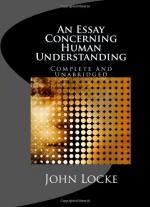|
This section contains 9,352 words (approx. 32 pages at 300 words per page) |

|
SOURCE: "'Master Builder' and 'Under Labourer'," in Reasoned Freedom: John Locke and Enlightenment, Cornell University Press, 1992, pp. 9-29.
In the following essay, Schouls argues that the "revolutionary" aspects of Locke's thought are a function of his scientific, as well as political, writings, since both emphasize the primacy of human reason. Schouls places Locke's scientific thought in the revolutionary tradition of Descartes, despite various doctrinal differences.
"master-builder" and "under-labourer"
In the Essay's "Epistle to the Reader," Locke refers to the "Master-Builders" ("a Boyle, or a Sydenham; … the Great—Huygenius, and the incomparable Mr. Newton") and with respect to them pronounces himself to be an "Under-Labourer" whose task consists in "clearing Ground a little, and removing some of the Rubbish, that lies in the way to Knowledge." These "Master-Builders" deal with "nature," with "knowledge" of "substances" and their "qualities" and "relations," with the objects of which we are aware through...
|
This section contains 9,352 words (approx. 32 pages at 300 words per page) |

|


